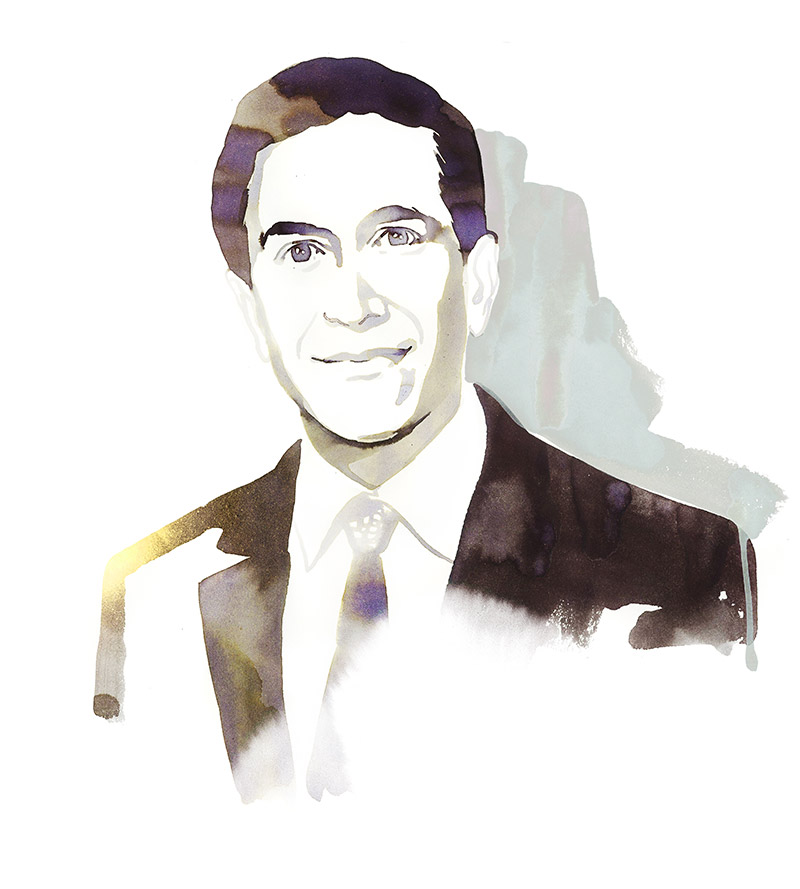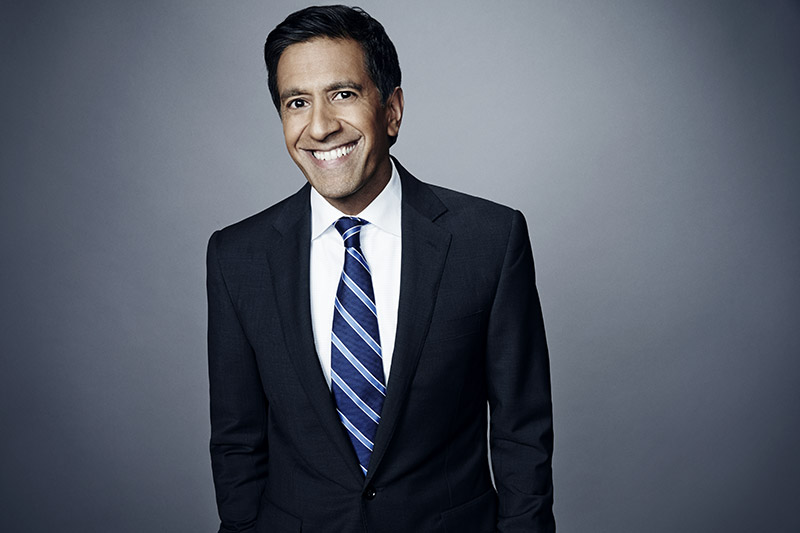Medical coverage
A conversation with CNN’s Sanjay Gupta, MD
He’s a practicing neurosurgeon and chief medical correspondent for CNN. But right now, Sanjay Gupta, MD, is making news for “doubling down” on his support for medical marijuana and apologizing “for having not dug deeply into the beneficial effects of this plant, and for writing articles dismissing its potential.”
Extras

Gupta joined CNN in the summer of 2001. Since that time he’s covered floods and earthquakes, tsunamis and oil spills along with the wars in Iraq and Afghanistan. He’s also an assistant professor of neurosurgery at Emory University School of Medicine and associate chief of the neurosurgery service at Grady Memorial Hospital in Atlanta. So where, you wonder, does he find time to write a novel, Monday Mornings, about life in the ER? Responding by email from Guinea where he was reporting on the Ebola outbreak, Gupta said that it took him 10 years on and off to write the novel. “I write a lot on weekends, at night and on planes. Many of the characters were amalgamations of people — real and fiction. Once I understood my characters (which took the longest time), the stories came more quickly.” Paul Costello, executive editor of Stanford Medicine, spoke with Gupta about surgery, medical reporting and his efforts to combat loneliness in America.
Paul Costello: In 2009, you wrote an article in Time opposing efforts to legalize the medical use of marijuana. You’ve changed your position. Why?
Sanjay Gupta: Typically as a reporter, I survey the medical literature on various topics, everything from heart disease, diabetes, neurodegenerative disorders, but also things like medical marijuana, potential new treatments for all sorts of things. When I looked at the literature [about marijuana] coming out of the United States, I just wasn’t that impressed. But I started to become aware of literature from smaller labs outside of the U.S. I also realized that many of the studies that were being done in the U.S. were designed to find harm.
Costello: Do you worry at all about the long-term risks of marijuana on cognitive and psychiatric disorders?
Gupta: Yes, I do. Yet the literature is pretty compelling with regard to the treatment for specific diseases, such as epilepsy, neuropathic pain and muscle spasms brought on by M.S. This is in addition to the things most physicians think marijuana may have a use for: curbing the side effects from chemotherapy, stimulating appetite.
Right now it’s a schedule-1 drug, ordained to have no medicinal benefit. It’s very hard to do double-blinded, randomized, prospective trials on something that is already preordained to have no medicinal benefit. No one is suggesting there aren’t any potential downsides to this as a medication. But in order to get answers to some of these questions and obtain the more satisfactory evidence in the United States, you have to make it easier to study.
Costello: Why a career as a neurosurgeon?
Gupta: A lot of my colleagues wanted to be brain surgeons since they were kids. That wasn’t the case for me. I thought I was going into pediatrics when I started medical school. I loved kids and loved spending my time on pediatric rotations. I did a rotation in neurosurgery and it was one of those things where I immediately fell in love. If someone has a problem in their brain or their spinal cord, you’re going to address it that day. It feels very concrete. I found the ability to take care of patients more immediately to be very gratifying.
Costello: What makes a great surgeon?
Gupta: One of the misconceptions is that these people are physical geniuses — extremely talented with their hands. There’s a small percentage of people who can’t do it, the coordination and dexterity just isn’t there. But I think the vast majority of people can be trained.
You have to be somebody who works well under pressure but is also not afraid to ask for help. That’s key. What you find among the very best surgeons: Their judgment is impeccable. They know not only where to operate but what operation to do. If they’re in a situation that is challenging or they don’t feel like they have complete control, they can ask for help.
Costello: Have you thought about how surgical training could be improved?
Gupta: When patients come to my office, fewer than half of them really need an operation. They’re coming to be evaluated. But what they are really coming for is knowledge — sometimes the most important knowledge that they’re going to hear for a long time, as it directly affects their lives. So it’s really important to make sure we train people to dispense that knowledge in a careful, compassionate way.
Costello: You recently launched a campaign to combat loneliness. How did this come about?
Gupta: The campaign, Just Say Hello, emanated from a lot of conversations I had with professionals in the field of psychology and psychiatry after the multiple mass shootings over the past couple of years. As a medical reporter I find myself reporting on a lot of these things. People always ask the same question, of why this happened. There’s never a satisfactory answer.
But I spent a lot of time with specialists just trying to understand what they thought of these shootings. Often someone is described as a loner or as lonely or isolated. That came up many, many times. Despite all things that would suggest otherwise — social media and seeming to be more interconnected than ever before — we may have become more lonely as a society. The consequences of feeling lonely, feeling that you live on the fringe, that’s what really fascinated me. When I talked with scientists who study loneliness, they told me a person relegated to the fringe would perceive things that seemed innocuous to most people as a threat.
Just Say Hello, obviously, is not an answer to the problem by any means. But it could be a beginning to an answer. It’s saying, “Look, I want to help. I know somebody at my workplace or my apartment building who is that guy or gal who is lonely.” Reaching out in some way could help set their lives on a different trajectory.
Costello: As you travel around the globe are there universal questions you’re asked about medicine, health care or the human condition?
Gupta: I think the thing that ties us together is our quest for good health. Most everyone wants to do good by their bodies, understand health, understand how they could improve the health of their family. I think the desire for good health and the desire for improved function is pretty universal.
Costello: In addition to a career as a physician, why did you want to be a journalist and storyteller?
Gupta: I always liked to tell stories. That’s what my parents and friends say. I wasn’t the best student when I was younger. One of the tricks I learned as a student that carried me through medical school was to really understand the stories behind things. Even when I was in medical school studying biological chemistry, understanding the stories behind the people who had made interesting discoveries and why they made those discoveries made it stick in my brain. I just like stories. I was a voracious reader. I remain somebody who likes to read all sorts of different topics. When I started writing, I felt it was a strength and just ran to it.
Costello: It’s well-known you had talks with President Obama about being surgeon general and turned it down. As you look down the road, do you see yourself in public service?
Gupta: I worked in the White House — in the Clinton administration. My interest at the time was in public service. I could absolutely see myself doing it again. The timing for the surgeon general job wasn’t right for me. I would have had to give up my job as a neurosurgeon, which I found quite ironic.
Costello: When you parachute into disasters around the globe what do you look for to tell a compelling story?
Gupta: Whether it’s Haiti, Japan after the tsunami or an earthquake in Pakistan, I think a lot of times it’s just getting out of the way of the camera. Pointing things out for people to see and draw their attention to, but not over-reporting.
There is a desire for me to reinforce the point that what is happening here is not so different from what could happen where you are. I think health more than anything else serves as a common denominator for that. People want good health. They also understand when people have been injured and they don’t have access to health. They may not be able to identify Damascus on a map but if I explain to them that when the bombs came raining down, the same family that had been driving their kids to school the day before, grocery shopping after that, stopping at a bank to withdraw some money from an ATM, that they are now fleeing with whatever few possessions they could gather and running for the border, that’s a family like a lot of families in your neighborhood. If they feel more compassionate, more compelled in some way, that’s what’s really important to me as a reporter.
 What's on Sanjay Gupta's mind?
What's on Sanjay Gupta's mind?
Talking about loneliness, cannabis, and what humans all have in common.
Photograph by Jeremy Freeman
